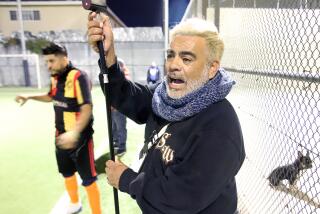WORLD CUP USA ‘94: SEMIFINALS : Stars at Their Zenith : Brilliance of Baggio, Stoitchkov and Romario Grows in Proportion to Stakes of World Cup
Watch them when they score. Watch their faces.
Everyone else stares in wonderment at the sky or into the stands, the better to understand his achievement and remember his glory.
For the record:
12:00 a.m. July 14, 1994 For the Record
Los Angeles Times Thursday July 14, 1994 Southland Edition Sports Part C Page 4 Column 1 Sports Desk 1 inches; 29 words Type of Material: Correction
World Cup--A story in Wednesday’s editions incorrectly referred to Italian star Roberto Baggio’s Buddhist affiliation. He practices the Buddhism of Nichiren Daishonin, a 13th Century Japanese sage.
Not these guys.
They close their eyes.
They need look at nothing, because they have seen it all before.
They require no understanding, as if they have known their task since birth.
They are heroes. This is their time.
Roberto Baggio of Italy. Hristo Stoitchkov of Bulgaria. Romario of Brazil.
As two years’ worth of soccer has whittled the world to four teams, it also has unveiled three genuine stars.
The World Cup semifinals today will feature these three men, special in that their level of play has risen along with the stakes.
They will carry not only their teams, but the remaining days of this tournament.
Because of their names, America is still interested. Because of what they can show us, America might still watch.
“The great ones have the ability to lift themselves on the world stage,” said Clive Toye, soccer entrepreneur who brought Pele to America. “The great ones use the World Cup to say, ‘Here I am!’ ”
And here they are, just what America loves, athletes with the stuff to hit the winning home run in the ninth, or winning three-pointer at the buzzer, or the last triple axel on a Saturday night.
World Cup organizers bemoaning the elimination of such glamour teams as Mexico and Argentina have forgotten our passion for glamour players.
We admire not only the athlete who performs under pressure but the one who pines for that pressure, who yells for the ball, who appears from nowhere when his team needs him most.
Jordan. Bird. Magic.
These men are those men in other lifetimes.
There is Roberto Baggio, a man no taller than a stalk of wheat, and with the gall to wear a braided ponytail, but a man with a heart as big as Montana and legs like anvils.
What will he do this time?
Will he take a pass and juke past the goalkeeper before making a game-winning shot from a nearly impossible angle, as he did in the quarterfinals against Spain?
When asked to describe that goal in detail, he refused. The great soccer players always do, as if there is nothing they can say that will make anyone understand.
“I have the determination and conviction to show the world I am a great player,” he says.
Then there is Hristo Stoitchkov, unshaven, swaggering, rude, compared by one writer to baseball star Kirk Gibson, and properly so.
What will he do this time?
Will he outrace one defender and run over another en route to scoring a stunning first goal, as he did in the second round against Mexico?
“I am used to games like these,” he said calmly after a dramatic, once-in-a-lifetime shootout victory over the Mexicans. “I prepare for matches like these.”
Finally there is Romario, known to his parents as Romario de Souza Farias, known to opponents for his speed and timing.
What will he do this time?
Will he take the ball from near midfield, race toward the net around two defenders and score a game-saving goal as he did in a first round tie against today’s opponent, Sweden?
“This is my cup,” Romario says. “I will give my blood for this cup.”
All three will. And so they are here, whereas Valderrama and Klinsmann and Maradona and Bergkamp are gone.
More than anything, the survivors relish the timing. They know the late rounds of the World Cup were written for soloists.
“Nobody has to worry anymore about tactics that will help a team in the standings, because there are no more standings,” former Italian star Giorgio Chinaglia said. “Right now, this is all about winning. These guys are freed to do whatever that takes. They know they can become the heroes. And they do.”
They also do not concern themselves with pressure.
“If anything, the World Cup is a vacation for the great players,” said Paul Gardner, noted soccer author. “These are some of the highest-paid athletes in the world who play for European pro teams where every move is scrutinized. They feel more pressure every day in Europe than they do during an entire World Cup.”
Each of the three stars began this World Cup slowly.
Baggio didn’t score until the fourth game.
Stoitchkov took five shots in the opener and blew every one.
Romario took only four shots in the first two games. He scored twice, but he was barely noticed.
But since the knockout rounds, when the burden of their countries has fallen to their shoulders, they act as if their load has been lightened.
In their last two games, those three have scored six goals.
“When everything is on the table, that is when these guy want it the most,” Chinaglia said.
Their differences extend well beyond the field too, into lifestyles and eccentricities. It is as if the most difficult thing is to be special in one arena and normal everywhere else.
In a country that is 98% Catholic, Baggio is a Buddhist who speaks by phone every day to his Zen master. His mother openly cries for his return to her faith.
In a country where 100% of the people speak Bulgarian, Stoitchkov refuses to speak Bulgarian to reporters. Proud of his accomplishments in Spain’s professional league, he says he will speak Spanish or nothing.
And in a country that has delighted us in the apparent unity of its fans and players, prima donna Romario holds a most unusual news conference.
In it, he announces he will not sit next to teammate Bebeto on the flight to the United States.
We hear some of these stories and shake our heads, not in judgment, but in wonder. Then quickly we straighten up, eyes forward.
The three stars each have, at most, two games left in this country, and we do not want to miss a thing.







